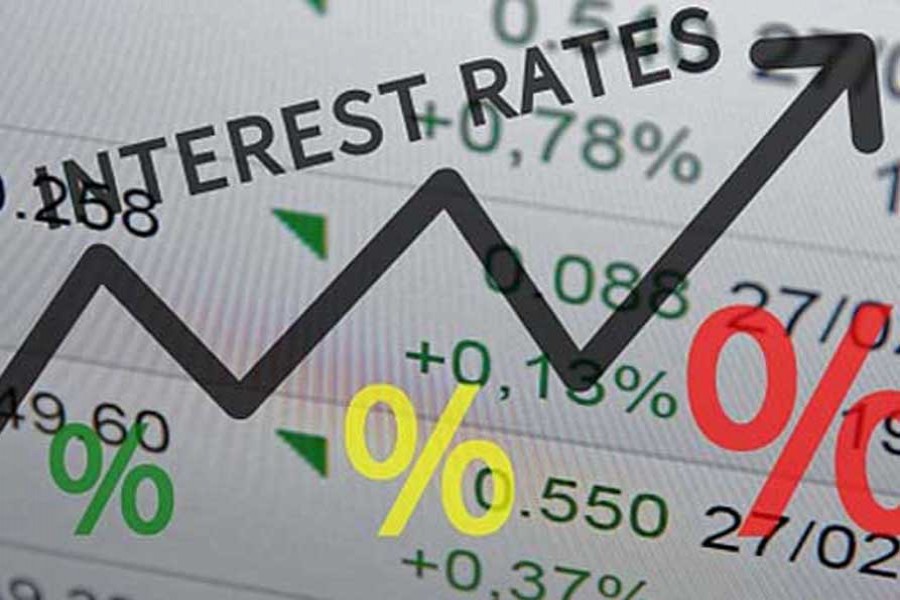When the Bangladesh Bank sets the target for the funds rate at which banks borrow from and lend to each other, it has a ripple effect across the entire economy. It usually takes around 12 months for any increase or decrease in interest rates to be felt in a widespread economic way. This is known as lagged impact. The market's response to a change (or the news of a change) is, however, often more immediate.
The interest rates that move markets are the policy rates. It includes bank rate, repo rate and reverse repo rate. Among these, bank rate is the cost that depository institutions are charged for borrowing money from central bank.
The policy rates are tools used by the Bangladesh Bank (BB) or any other central bank to control money supply and ultimately to contain inflation, mostly demand-pull one (an increase in price levels due to high demand against low supply). So, by increasing the bank rate, the BB attempts to shrink the supply of money in the market and consequently makes the money more expensive. Conversely, by decreasing the bank rate, BB tries to increase the money supply and make the loan cheaper, encouraging spending.
When the BB increases the bank rate, it may indirectly affect the stock market. It makes the borrowing from financial institutions costly for the clients and, in turn, decrease the amount of money consumers can spend. After all, people still have to pay the bills, and when those bills become more expensive, households are left with less disposable income. This means that people will spend less discretionary money, which will affect businesses' top and bottom lines (that is, revenues and profits).
But businesses are affected in a more direct way as well. They too borrow money from banks to run and expand their operations. When the banks make borrowing more expensive, companies might not borrow as much and will pay higher rates of interest on their loans. Less business spending can slow down the growth of a company; it might curtail expansion plans and new ventures and even induce cutbacks. There might be a decrease in earnings as well - which, for a public company, usually means the stock price takes a hit.
If a company is seen as cutting back on its growth spending or is making less profit either through higher debt expenses or less revenue, then the estimated amount of future cash flows will drop. All else being equal, this will lower the price of the company's stock. (A key way to value a company is to take the sum of all the expected future cash flows from that company discounted back to the present. To arrive at a stock's price, take the sum of the future discounted cash flow and divide it by the number of shares available.). With a lowered expectation in the growth and future cash flows of the company, investors will not get as much growth from stock price appreciation, making stock ownership less desirable. Furthermore, investing in equities can be viewed as too risky compared to other investments.
When the economy is slowing, the central bank cuts the bank rate to stimulate financial activities. A decrease in interest rates by the central bank has the opposite effect to a rate hike. Investors and economists alike view lower interest rates as catalysts for growth - a benefit to personal and corporate borrowing, which in turn leads to greater profits and a robust economy. Consumers will spend more, the lower interest rates encouraging them to feel they can finally afford that new house or send the kids to a private school; businesses will enjoy the ability to finance operations, acquisitions and expansions at a cheaper rate, thereby increasing their future earnings potential, which, in turn, leads to higher stock prices.
Rising or falling interest rates also affect investors' psychology - and the markets are nothing if not psychological. When the central bank announces a hike, both businesses and consumers will cut back on spending; this will cause earnings to fall and stock prices to drop, everyone thinks - and the market tumbles in anticipation. On the other hand, when Bangladesh Bank or any central bank announces a cut, the assumption is that consumers and businesses will increase spending and investment, causing stock prices to rise - and the market jumps for joy.
However, if expectations differ significantly from the BB's actions, these generalised or conventional reactions may not apply. The business cycle can also affect the market's reaction. At the onset of a weakening economy, the modest boost provided by lower rates is not enough to offset the loss of economic activity, and stocks continue to decline. Conversely, towards the end of a boom cycle, when the central bank is moving in to raise rates - a nod to improved corporate profits - certain sectors often continue to do well, such as technology stocks and entertainment/recreational company stocks.
Although the relationship between interest rates and the stock market is fairly indirect, these two tend to move in opposite directions. A general rule of thumb is: interest rates reduction pushes the stock market to go up and rise in the interest rates drive the stock market to go down. But no perfect prediction is possible on how the market will react to change in the central bank's policy rates.
Sk. Shamim Iqbal, an MBA in Banking from the University of Dhaka, is now serving at a private commercial bank.


